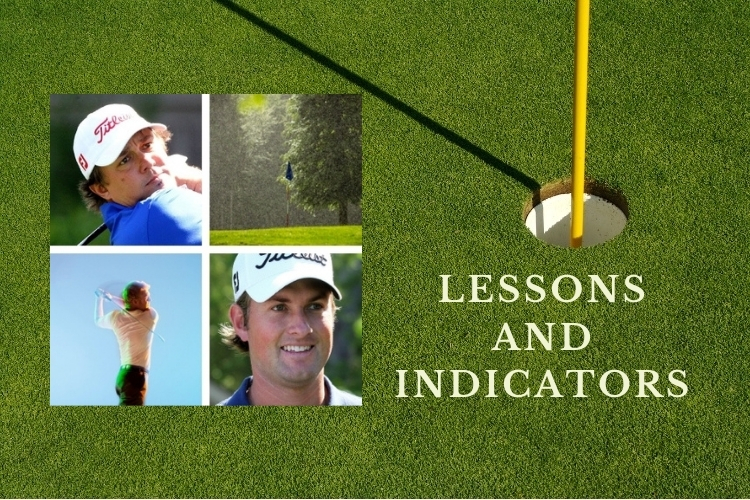What are some of the lessons you can take when thinking about betting on golf? Try these. Consider them clues, and indicators…
Change your mind
Entering the 2012 Zurich Classic, Jason Dufner had played in 163 PGA Tour events – winning none. He’d lost a play-off in Phoenix, another in Atlanta; he was, by definition, a nearly-man. Despite his demeanour – later to become an internet meme, so unmoved is Dufner by just about anything – here was someone who just didn’t win. Worse, he didn’t know how to.


Jason Dufner defied all trends
Then came start 164. Dufner, now familiar with being at the top of the leader board at various stops bar the final one, found himself in a play-off with the legendary Ernie Els. Here we go again, thought everyone else; Dufner meanwhile set about taking care of business. At the par-five 18th, he fired a nerveless second shot into the heart of the green, two-putted, and victory was his.
Alone this isn’t extraordinary – many a journeyman, many a nearly-man, has managed somehow to win before reverting to type. Dufner was different. Two starts later, a one-in-164 strike rate became two-in-166, when he won like a seasoned winner in Texas. The following year, he avenged his previous play-off defeat to take the PGA Championship.
Dufner won none of his first 163 events on the PGA Tour. Then something changed, and he won three of his next 35. From 2012 to 2017 he collected five wins, including that major, and is now considered to be a good closer – the type of player upon whom one can rely when it comes to the crunch.
Three years after Dufner won the PGA, Jimmy Walker got his hands on the Wanamaker Trophy, beating one of the best players in the game at the time in Jason Day. Walker’s journey had been similar to Dufner’s: he went 187 starts before winning, then he won six times in less than three years, culminating in that major championship.
When someone tells you they know all there is to know about a golfer, ignore them. Golfers are human: they change, they adapt; they progress, they regress. Keeping an open mind to the myriad ways a career can develop is important. Reacting to the implications of an act – be it winning at last, or be it blowing a big lead – is vital.
Contextualise everything


Webb Simpson
There is no such thing as too much information – providing you accept that it will all need filtering. So much is now available that it’s laborious to do so, the processes involved imperfect, and the rewards often delayed. But it still needs doing.
Just as the golfer who reaches the top of the world rankings has beat a thousand balls on the range, so does the would-be expert need to apply themselves to gather and process as much information as possible.
As far as the processing goes, the best example might be course form, and how it needs contextualising. Back in 2011, Webb Simpson went from missing the cut in the Phoenix Open on his previous visit, to finishing eighth. He was second at Louisiana, where he’d also missed the cut a year earlier. Quickly, it became apparent that the answer to this jolt of improvement was simple: Simpson was a vastly improved golfer, and what he’d achieved in the past told us little about the present.
So when you look at course form, in particular, be sure to look around it. If you see that a player finished fifth at Augusta last year, that information is valuable in and of itself. It becomes even more valuable if that player had been out of sorts beforehand.
Drive for dough, putt for show
Reverse the old maxim. Putting might help separate players on Sunday – but not as often as you’d think. Long-term, it is an unreliable predictor. The best putters have more bad days with the putter than the best ball-strikers do from tee-to-green. The most lucrative careers are built on the foundations of quality driving and quality iron play.


Is it still “putt for dough”?
Take the 2020 putting stats as a fair indicator. Among the end-of-year top 10 in strokes-gained putting, just one – Bryson DeChambeau – won on the PGA Tour. DeChambeau ranked 10th, gaining 0.658 strokes per round – approximately 2.5 per tournament – on the field. Leader Denny McCarthy gained almost a shot every time he played.
Off the tee, the top 10 included three of the game’s best players – DeChambeau, Jon Rahm and Rory McIlroy. There was the standout rookie, Scottie Scheffler, and one of the game’s second-wave elite players in Xander Schauffele, stud-in-the-making Cameron Champ, and major champion Sergio Garcia. Dustin Johnson ranked 11th. Five of the 10 won.
The most predictive and reliable category, however, doesn’t feature in the phrase you’ll have heard before. Nobody really talks about approach shots, and yet strokes-gained approach is arguably the most predictive and reliable indicator of success.
All told, last season’s top 10 included its only major champion, Collin Morikawa, who was second only to Justin Thomas, winner of probably the next-most-prestigious event played. It included the best players from England and Asia, the rising star from Norway named Viktor Hovland, and the multiple winner Webb Simpson. Again, Dustin Johnson was not far from the top 20.
Johnson wound up as the FedEx Cup champion. He gained over a shot per round with his long-game throughout the season, and less than a third of a shot chipping and putting. Short-games can win titles but they seldom power careers. Over time, it’s all about the tee-to-green.
The price has to be right


Weather can have a big impact on a players’ performance
Modelling golf is as difficult as it gets. Virtually every other sport upon which millions are traded is far less exposed, far less vulnerable, to things beyond anyone’s calculation. The weather is probably the simplest example – golf is an outdoor sport where players in the same tournament on the same day may face drastically different conditions. At the recent Scottish Open, where the draw was split in two, those teeing off early on day one found the course four shots harder than those teeing off late.
All of which is to say we have to accept that there’s a greater degree of uncertainty in pricing, and that allowances have to be made. The lines we draw are our own, and the factors which are input will vary. Ultimately, though, a line has to be drawn.
At the aforementioned Scottish Open, I put up Eddie Pepperell at 150/1. He’d been out of form, but loves links golf, and there were grounds for expecting improvement on a quiet summer. Pepperell finished ninth, then went on to finish sixth the following week. When he returned to Scotland for the Scottish Championship, he was among the favourites at 14/1.
Pepperell’s prospects had obviously strengthened – not least because the field had weakened. But he was, in my eyes, too short, and had to be left out as a consequence. Those who still made him a bet were not wrong; they just processed the same information in a slightly different way. It’s that which gives us something to bet on in the first place.
Don’t ignore that which you can’t measure
Finally, I would encourage anyone betting on golf to recognise that state of mind can have a dramatic effect on a player’s performance. It’s trite to say golf is a game played between the ears, but there’s a measure of truth to that, and I would argue it’s more vulnerable to mental factors than virtually any other sport.
Some prefer to deny the possibility that becoming a father, seeing a loved one pass away, or seeing a friend win a big tournament can be so influential. That’s because we can’t measure it. It doesn’t mean we should deny it.
How do we put it to use? That comes back to contextualisation. Becoming a dad isn’t going to make the world’s 200th-best player the next Rory McIlroy. But it could be the final piece of a complicated jigsaw, one which has very real and immediate implications – which we can profit from just as much as them.
Anyone who has been fortunate enough to become a parent shouldn’t have a hard time accepting its transformative power.
Ben Coley is a British sports writer who specialises in golf. You can find him on Twitter @bencoleygolf.
Back to Top








